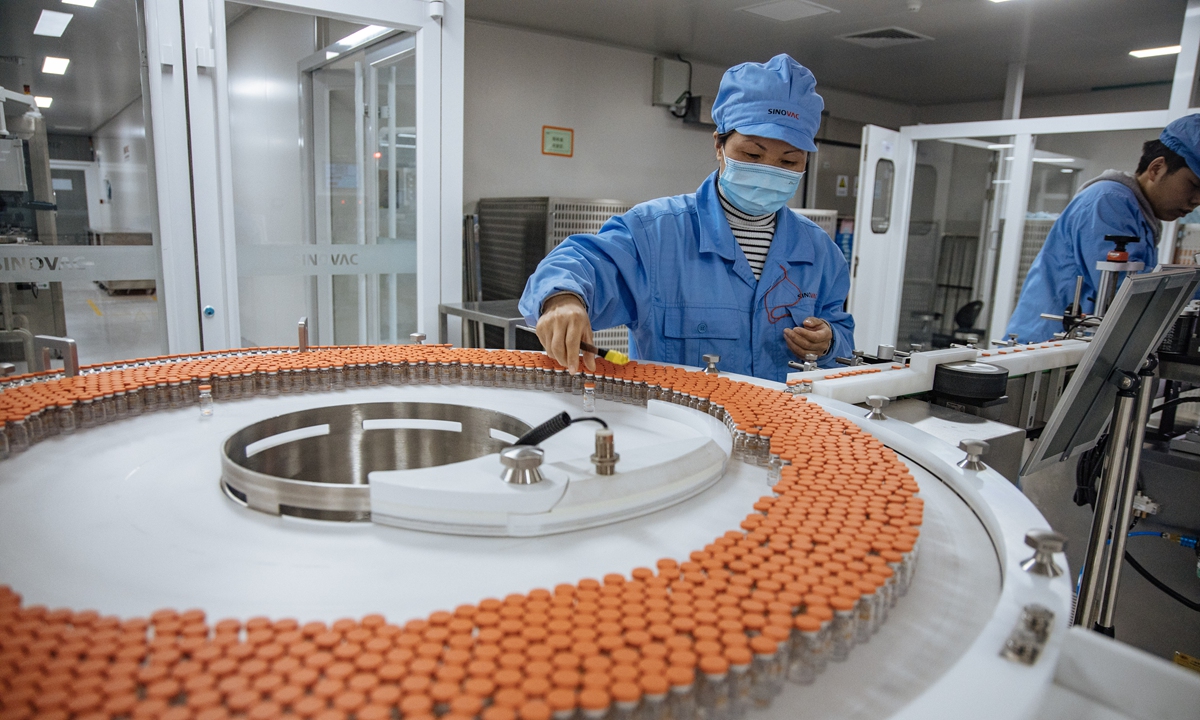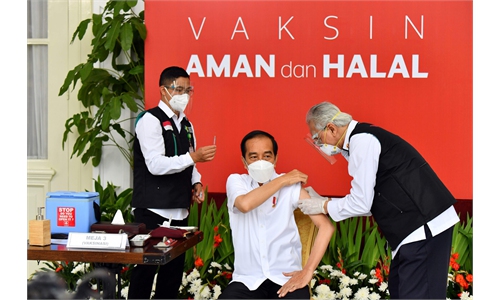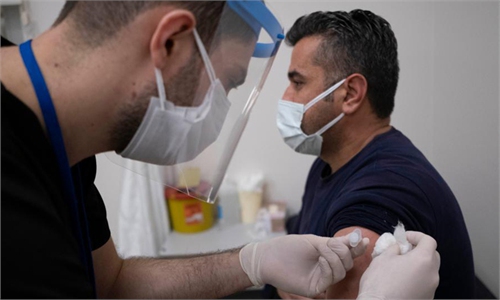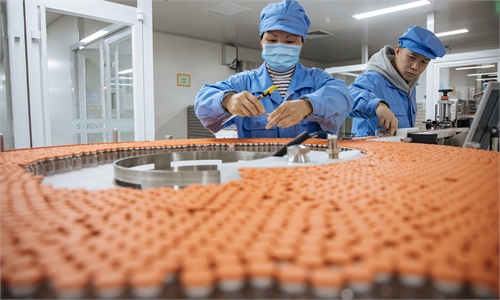
The COVID-19 vaccine Beijing manufacturing plant of leading Chinese vaccine producer Sinovac Photo: Li Hao/GT
A vaccine is supposed to be the last fortress against the raging novel coronavirus pandemic. In the eyes of India, however, it has become a lever in its tool kit to compete with China.The Times of India (TOI) whined on Monday in an article entitled, "China starts smear campaign against India's vaccine diplomacy." Under the name of clarifying the so-called smears, the TOI was attempting to prove the Indian vaccine outweighs that of China with a series of other pieces actually defaming Chinese vaccines.
The article started by complaining that Global Times raised questions about India's capacity to manufacture vaccines after the fire at the Serum Institute of India (SII), which, according to media reports, is producing more than 50 million doses of the Oxford-AstraZeneca coronavirus vaccine a month. Yet concerns are natural for anyone who has seen thick clouds of smoke billowing from the site, 10 fire tenders rushing to the spot, and news stories that the fire had killed five people. Many Twitter users share the same uneasiness over the fire's influence on SII's vaccine manufacturing capacity. Plus, isn't raising questions one of the main functions of media outlets?
Immediately afterward, the TOI began its offense. It argues that "China has had little to offer" to regional countries, in contrast to the Indian effort, then listed the example of Bangladesh, saying China-Bangladesh cooperation over the development of vaccines reached a deadlock since the latter "refused to contribute" relevant costs.
In transnational joint clinical trials, it is a common practice for different companies to share the costs. And it is also normal to see disputes during related negotiations. Worse, an insider told Global Times that the China-Bangladesh cooperation was also disturbed due to interference from India.
The TOI skirted around those parts, while laying bare its cockiness. It flaunted India's achievement by claiming "Cambodia recently requested India for vaccines despite having received a million doses of Chinese vaccines." It overlooked the fact that an increasing number of countries are purchasing vaccines from different developers to secure sufficient doses for their people. Yet India obviously believes that vaccine procurement is a geopolitical choice.
In the end, the article argues Indian vaccines have no "quality concerns" because many countries are buying from New Delhi. The conclusion is well choreographed with its other op-eds, such as one that claimed "Chinese vaccines lack transparency."
India does not need to stare at China's response toward Indian vaccines, neither should it be so vexatious to seek the approval from China of India's vaccines. Whether a vaccine is safe and efficient, facts speak louder than words.
On January 16, India launched its nationwide COVID-19 vaccination. On the same day, 51 vaccine recipients experienced adverse after effects and one was admitted to the ICU. This was only the situation in New Delhi. As of press time, reports show at least eight people had died across India after they were given vaccines. Not to mention Covaxin - India's first indigenous coronavirus vaccine and was recently given the emergency approval for public use - has not completed Phase-III trials. In July 2020, Science magazine put it bluntly that scientists "scoff" at the goal of the Indian government agency to test and approve its homegrown COVID-19 vaccine at such a high speed.
In comparison, not a single death occurred in China for having received coronavirus vaccines. So far, more than 40 countries have asked to import Chinese vaccines. The leaders of more and more countries have received shots of Chinese vaccines in person, including Turkish President Recep Erdogan, Seychelles President Ram Karawang, Jordanian Prime Minister Khasawneh, Indonesian President Joko Widodo and Bahrain Crown Prince and Prime Minister Salman. Serbian President Vucic and Cambodian Prime Minister Hun Sen also expressed their readiness to get vaccinated with Chinese vaccines.
If they do not trust Chinese vaccines, would they endorse them by staking their personal reputation and health?
When it comes to the transparency of Chinese vaccine research and development, China has its own standard and protocol. Manufacturers are not allowed to publish data without official approval, in an attempt to ensure the process won't be influenced by political or public opinion pressure as the situation in the US. More importantly, since the epidemic on Chinese soil has been reined in, almost all the Phase-III trials of Chinese vaccines are conducted overseas. The process and the publication of data are not under China's control.
More ridiculously, India has admitted that it is using vaccines as a diplomatic tool with straightforward headlines on media reports, such as "Can India Offset Chinese Influence Through Its Vaccine Diplomacy?"
It is nothing new that India takes China as its imaginary rival in every aspect. It has been holding grudges for not being able to catch up with Chinese investment in Sri Lanka, Nepal and the Maldives. But New Delhi may have suddenly found that it could reinitialize its power and prestige as a South Asian hegemon through its pharmaceutical advantage. "It's a well-crafted, calibrated series of actions you are seeing, they confirm the validity of our 'neighborhood first' policy," former ambassador Rajiv Bhatia said. "This is our moment to shine."
India has huge potential for vaccines production. If the country is sincere in devoting itself in the battle against the global public health crisis, it is worth being encouraged. In the face of the pandemic, only unity can boost our efforts to protect and save more lives. But "this issue can afford no place for maligning competition, let alone the so-called rivalry," Chinese Foreign Ministry spokesperson Zhao Lijian stressed on Monday's regular press conference.
India is under pressure of a severe epidemic, inefficient prevention and control measures, and the lack of guarantee over the safety of its own vaccines. At this time, neither defaming Chinese vaccines nor competing with China geopolitically via "vaccine diplomacy" will bring any help to itself, not to mention the world.
India's COVID-19 infections have surpassed 10.6 million with more than 153,000 deaths as of press time. The two figures rank second and third across the world, respectively. Quite a few reports, including those from Western countries, noted that India's infection may have been grossly underestimated. For the moment, curbing its domestic epidemic could be India's important contribution to the world.



